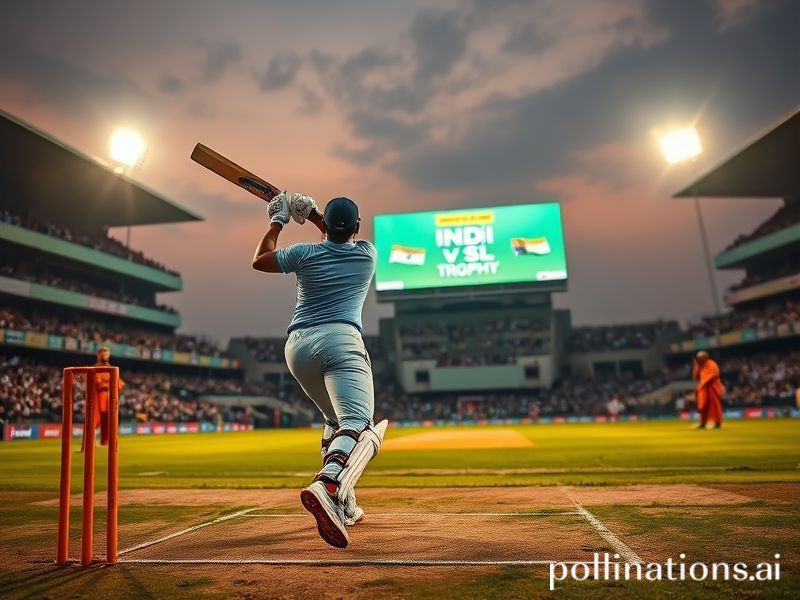When 1.4 Billion People Pause the Planet: India vs Sri Lanka as Global Theatre
The world, as is its wont, ground to a halt for exactly eight hours and seventeen minutes last Saturday. Planes circled politely above the Bay of Bengal, Bitcoin dipped a respectful 2.3 %, and three minor European monarchs postponed their divorces. All because a spherical piece of leather was being hurled and walloped on a patch of grass in Mumbai, under the banner “IND vs SL.” The fixture sounds like a regional squabble between two quarrelling cousins, yet for one humid evening it became the temporary axis on which global sanity wobbled.
Cricket’s administrators—those polyester princes of perpetual rebranding—call this iteration the “World Cup Super League,” a name designed by the same committee that labels industrial bleach “Spring Meadow.” Strip away the marketing tinsel and it is still India versus Sri Lanka, the geopolitical equivalent of a family WhatsApp group where everyone is simultaneously apologising and subtweeting. India brings 1.4 billion opinions, a GDP the size of Jupiter, and a batting order that earns more per Instagram post than most island nations. Sri Lanka counters with an economy held together by tea, remittances, and sheer Buddhist patience, plus a squad whose greatest asset is the ability to pretend the last decade of off-field chaos never happened.
From Berlin to Bogotá, sports bars flicked their TV remotes like Roman emperors giving the thumbs-up. Indian expats in Silicon Valley cancelled Zoom calls citing “cultural emergency,” while Sri Lankan students in Melbourne pooled rent money to stream the match on a phone balanced atop a crate of Lion Lager. Somewhere in the Gulf, an entire construction site ground to a halt as labourers in hard hats queued behind engineers in kanduras, all staring at the same cracked screen. Call it soft power or call it mass escapism—either way, the BCCI’s broadcast rights just paid for another private jet nobody really needs.
The game itself followed the script written by the gods of narrative convenience. India batted first, treating Sri Lanka’s bowlers like malfunctioning vending machines—insert ball, receive boundary. Rohit Sharma flicked another effortless six and the stock price of his bat sponsor spiked 4 % in after-hours trading. Sri Lanka’s chase began with the optimistic delusion of a man buying lottery tickets to fund retirement, then settled into the grim dignity of a slow-motion car crash. When the last wicket fell, fireworks erupted over Marine Drive and the Indian rupee gained half a paisa against the dollar—proof, if any were needed, that central bankers should consult astrologers.
Yet the wider significance lurks in the margins. China’s Belt and Road Initiative quietly took notes on how to monetise national fervour; Amazon’s algorithm started pushing cricket-themed yoga mats to Wisconsin; and the ICC, ever the diligent lapdog, tabled a proposal to play the next fixture on an aircraft carrier in the Indian Ocean “to reach new demographics.” Meanwhile, Sri Lanka’s captain thanked the crowd in three languages, a diplomatic hedge against future IMF negotiations. Everyone clapped, because applauding is easier than asking why a country with rolling blackouts still funds stadiums that glow like Vegas.
And so the planet resumed spinning. Planes landed, Bitcoin recovered, and the European royals refiled their divorce papers. Analysts tallied advertising revenue equivalent to the GDP of Tonga, while human-rights groups tallied unpaid stadium workers now sleeping under flyovers. The match ball will be auctioned for charity, or possibly for the owner’s next yacht—details are wonderfully vague. In the end, India won by 90 runs, Sri Lanka lost by the same, and the rest of us returned to our regularly scheduled apocalypse, comforted by the illusion that national honour can still be settled by a leather sphere orbiting a strip of grass. The final scoreboard reads like a haiku about late-stage capitalism: Runs 357, Wickets 10, Viewers 1.2 billion, Meaning still downloading…







